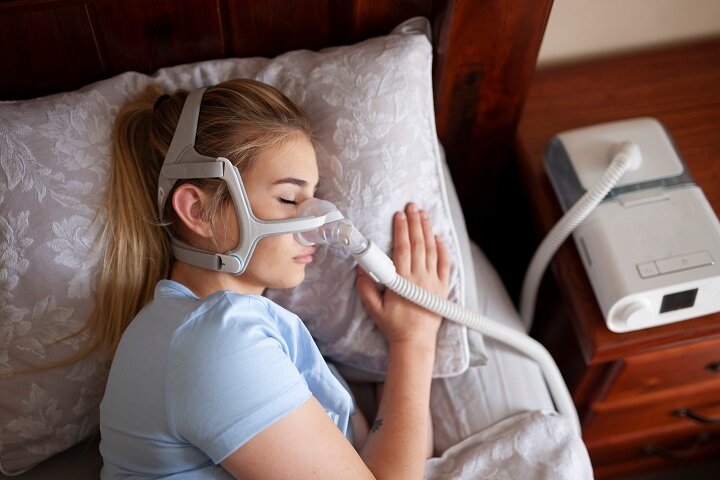Sleep apnea is a serious disorder where breathing repeatedly stops and starts during rest. There are three primary types: obstructive sleep apnea (OSA), central sleep apnea (CSA), and complex sleep apnea syndrome (also known as treatment-emergent central sleep apnea).
People with OSA experience blockages in the airway, often due to relaxed throat muscles. CSA, on the other hand, involves problems with the brain signaling the muscles that control breathing. Complex sleep apnea is a combination of both OSA and CSA.
Symptoms of sleep apnea include loud snoring, gasping for air during sleep, dry mouth, morning headaches, and excessive daytime sleepiness. Diagnosing sleep apnea typically involves a sleep study, called polysomnography, which monitors your sleep cycles, breathing patterns, and other vital signs overnight.
Sleep apnea doesn’t just affect sleep—it impacts daily life and overall health significantly. Those with untreated sleep apnea are at greater risk for high blood pressure, stroke, heart attack, and diabetes. Additionally, it can lead to mood swings, irritability, and difficulty concentrating, making routine tasks and work challenging.
Understanding the prevalence and risk factors for sleep apnea can guide prevention and management. Common risk factors include obesity, a narrowed airway, family history, smoking, and chronic nasal congestion. It can affect anyone, but middle-aged and older adults, particularly men, are more likely to develop the condition.
The Stress-Sleep Apnea Connection
Stress can wreak havoc on the body, and its effects go beyond just feeling overwhelmed or anxious. It triggers a cascade of physiological responses, including the release of stress hormones like cortisol. These hormones can disturb the normal functioning of various bodily systems, including those that regulate sleep.
Research has established a clear link between stress and sleep apnea. When you’re stressed, the muscles in your body, including those in your throat, can tense up and contribute to airway blockages, worsening the symptoms of obstructive sleep apnea. Central sleep apnea can also be exacerbated by stress as it affects the brain’s ability to properly regulate breathing during sleep.
Numerous studies back this connection. For example, some research has found that people with higher stress levels are more likely to experience the sporadic breathing characteristic of sleep apnea. Additionally, patients often report heightened stress levels either prior to or following a sleep apnea diagnosis, creating a cycle that’s hard to break.
Common stress triggers for sleep apnea patients can range from workplace pressures and financial worries to health concerns and family issues. Recognizing these triggers is the first step in finding ways to manage stress and minimize its impact on sleep apnea.
Understanding how stress affects sleep apnea can empower patients to take effective actions. Knowing the signs of stress and the ways it can exacerbate sleep apnea symptoms is crucial for developing a comprehensive treatment plan.
Recognizing and Managing Stress in Sleep Apnea Patients
Identifying stress symptoms in those with sleep apnea is crucial. Often, stress manifests as irritability, frequent headaches, muscle tension, or even changes in appetite. When these signs coincide with disrupted sleep, it’s worth considering the stress-sleep apnea link.
Changing behavior and lifestyle can help manage stress and, in turn, alleviate some sleep apnea symptoms. Simple measures, such as maintaining a consistent sleep schedule, avoiding caffeine and heavy meals before bed, and creating a peaceful sleep environment, can make a big difference.
Relaxation techniques offer another helpful approach. Practices like mindfulness meditation, deep breathing exercises, and yoga can effectively reduce stress levels. These techniques can be easily incorporated into a daily routine and are particularly beneficial before bedtime.
Medical interventions and therapies also play a key role. Cognitive-behavioral therapy (CBT) is a highly effective way to manage stress, as it helps patients develop healthier thought patterns and coping mechanisms. Additionally, consulting with a healthcare provider about possible sleep apnea treatments can further assist in reducing stress and improving sleep quality.
Improving Sleep Quality Through Stress Reduction
Good sleep hygiene is a cornerstone for managing sleep apnea and reducing stress. This involves creating a sleep-friendly environment – think cool, dark, and quiet. Keeping screens out of the bedroom and establishing a consistent bedtime can help signal your body that it’s time to wind down.
Your bedtime routine also plays a significant role. Engaging in calming activities like reading a book, taking a warm bath, or practicing relaxation exercises can prime your body and mind for sleep. Consistency is key, so try to stick to the same routine every night.
Physical activity is another powerful tool. Regular exercise, even something as simple as a daily walk, can reduce stress and improve sleep quality. Pair this with good nutrition – a balanced diet rich in fruits, vegetables, and lean proteins – to support overall health and well-being.
Finally, leaning on support systems can make a big difference. Whether it’s family, friends, or support groups, having someone to talk to can alleviate stress. Moreover, professional help from doctors and therapists can provide tailored advice and treatment options, ensuring a comprehensive approach to managing sleep apnea and stress.

